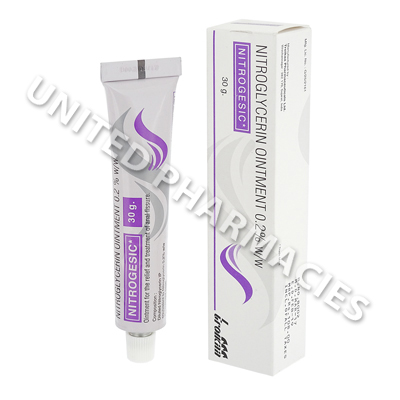Customers also like
Rectogesic Ointment (Glyceryl Trinitrate) - 0.2% (30g)
from only £32.51
Ultraproct Ointment (Cinchocaine/Fluocortolone) - 5mg/1mg (30g Tube)
from only £13.19
Thrombophob Gel (Heparin Sodium IP) - 200 I.U. (20g)
from only £5.11
Daflon (Diosmine/Hesperidin) - 450mg/500mg (60 Tablets)
from only £13.39
Daflon (Rutaceae) - 500mg (10 Tablets)
from only £4.14
Description
| Main Use | Active Ingredient | Marketed Name |
| Treating anal fissures | Nitroglyceryl | Nitrogesic Ointment |
Uses
Nitrogesic Ointment (Nitroglyceryl) is a topical treatment used to provide relief from pain caused by anal fissures (painful tears that can occur in the anus). Constipation or spasms of the internal sphincter can result in anal fissures, and patients may often experience pain and bleeding when passing stools.
If the fissure is ongoing (referred to as a chronic anal fissure), a doctor may prescribe this ointment to reduce pain and aid the healing process. By increasing the supply of blood and relaxing muscles in the anus, this medicine can contribute to the healing process. The active ingredient in this medicine may sometimes be called glyceryl trinitrate or nitroglycerin.
Dosage and Administration
Nitrogesic Ointment (Nitroglyceryl) is applied to the anus. Doctors usually recommend wearing special gloves for the application. Patients are sometimes instructed by their doctor to apply a strip of ointment measuring 1cm to 1.5cm to the inside of the anal canal. Treatment of anal fissures may sometimes require applying the ointment 3 times per day. However, it is essential that patients have a 12 hour interval every day where the ointment is not used, so as to avoid tolerance. All application instructions given by the doctor providing medical treatment must be strictly followed, and in all cases, patients will be told by their doctor how long they need to continue using the ointment for.
Side effects
Application of Nitrogesic Ointment (Nitroglyceryl) can result in a small amount of the ointment being absorbed into the blood, which could result in side effects. A list of possible reactions that may occur in patients using this ointment is provided here:
- Headache
- Dizziness
- Bleeding of the rectum
- Itchiness around the application site
- Reduced ability to control bowel movements
If any side effects occur, you may need to lower your dosage. In all cases, your doctor will tell you what to do if any side effects occur. Seek medical care straight away if any serious reactions occur.
Precautions
Patients with anaemia that is severe in nature, glaucoma, low blood pressure, high pressure inside the head or migraine should not use this ointment.
This ointment should never be ingested.
Seek immediate emergency medical attention if you suffer an allergic reaction. Symptoms to watch for, which may be indicative of a reaction, include skin rashes, hives, swelling of the face or limbs, trouble breathing, and trouble swallowing.
Always use Nitrogesic Ointment (Nitroglyceryl) as you have been prescribed by your doctor. Never self-medicate or change your dosage without first consulting your doctor. The correct dosage can vary depending on your health, medical history, and the severity of the condition being treated.
This medication may not be safe for all patients. Before you begin using it always disclose the following to your doctor:
- If you are pregnant or breastfeeding.
- If you suffer from any allergies.
- If you suffer from any other health conditions or illnesses.
- If you are using any other medicine (including all non-prescription).
- If you are using any supplements, vitamins, or herbal products of any kind.



-UK-1s.jpg)
-UK-1s.jpg)
-5mg-1mg-UK-1s.jpg)
-20g-UK-1s.jpg)
-Tab-450mg-500mg-UK-1s.jpg)




